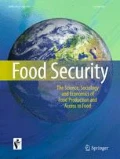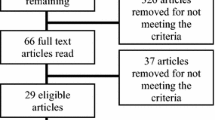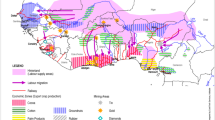Abstract
Iraq’s food security has been profoundly affected by its oil-based economy, over three decades of conflict and its politics that have been shaped by authoritarian rentierism. The article outlines the political economy of food security in Iraq and how it has been shaped historically. It identifies various conditioning factors such as oil, conflict, environment, agricultural development strategies and institutional setups, such as the Public Distribution System (PDS), the world’s largest public food program. It then disentangles these factors in an analysis of data from Gallup, Iraq Body Count and various international organizations to give an appreciation of the Iraqi food security situation since the end of the Saddam regime. Finally, it takes a look at views of Iraqi experts on current food security issues in Iraq, using the results of an online survey that was conducted from May–October 2015 among 152 Iraqi experts from academia, ministries and NGOs. Iraqis overwhelmingly identify political instability and bad governance as major challenges to food security; it is unlikely that mere technocratic policy prescriptions can improve food security in the absence of political stability and improved governance.


Similar content being viewed by others
References
Action Contre la Faim (ACF), & FAO. (2014). Iraq: Rapid assessment of agricultural livelihoods. Erbil: Tilkaif District – Ninewah Province.
Ahmad, M. (2002). Agricultural Policy Issues and Challenges in Iraq: Short- and Medium-term Options. In K. A. Mahdi (Ed.), Iraq's Economic Predicament (pp. 169–199, Exeter Islamic Studies Series). Reading: Ithaca Press.
Al Khouri, R. (2009). Market assessment for voucher program options. Erbil: Unpublished background report for WFP.
Al-Ali, Z. (2014). The struggle for Iraq's future: How corruption, incompetence and sectarianism have undermined democracy. In New haven. London: Yale University Press.
Al-Haboby, A., Breisinger, C., Debowicz, D., El-Hakim, A. H., Ferguson, J., & Telleria, R., et al. (2014). Agriculture for Development in Iraq? Estimating the Impacts of Achieving the Agricultural Targets of the National Development Plan 2013–2017 on Economic Growth, Incomes, and Gender Equality. IFPRI Discussion Paper (Vol. 01349, May). Washington D. C.: International Food Policy Reserach Center (IFPRI).
Amendola, N., & Vecchi, G. (2010a). Constructing a welfare indicator for poverty analysis in Iraq. World Bank: Washington D. C.
Amendola, N., & Vecchi, G. (2010b). Setting a poverty line for Iraq. World Bank: Washington D. C.
Amendola, N., Razzaz, S., Sorrentino, M., & Vecchi, G. (2010). The impact of the public distribution system on living standards - some microsimulations. World Bank: Washington D. C.
Baath Party Regional Command (1994–96). Various correspondence: 027–2–4-0010, 041–2–2-0001, 01_3439_0001_0000, 01_3730_ 0003_0452. Boxfiles Dataset from the Ba’th Regional Command Collection 1968–2003: Hoover Institution at Stanford University.
Baltar, F., & Brunet, I. (2012). Social research 2.0: Virtual snowball sampling method using Facebook. Internet Research, 22(1), 57–74. doi:10.1108/10662241211199960.
Baram, A. (1997). Neo-tribalism in Iraq: Saddam Hussein's tribal policies 1991-96. International Journal of Middle East Studies, 29(1), 1–31. doi:10.2307/163849.
Billon, P. L. (2005). Corruption, reconstruction and oil governance in Iraq. Third World Quarterly, 26(4/5), 685–703.
BP. (2015). Statistical Review of World Energy, 2015 http://www.bp.com/en/global/corporate/about-bp/energy-economics/statistical-review-of-world-energy/statistical-review-downloads.html. Accessed 9 Oct 2015.
Brickman Bhutta, C. (2012). Not by the book: Facebook as a sampling frame. Sociological Methods & Research, 41(1), 57–88. doi:10.1177/0049124112440795.
Chulov, M. (2009). Iraq: Water, Water Nowhere. World Policy Journal(Winter 2009/ 2010), 33–40.
Dodge, T. (2013). Iraq : from war to a new authoritarianism (Adelphi series). In London. New York: Routledge for the International Institute for Strategic Studies.
Drèze, J., & Gazdar, H. (1992). Hunger and poverty in Iraq, 1991. World Development, 20(7), 921–945. doi:10.1016/0305-750X(92)90121-B.
Duggan, S. E. (2012). Redefining the relationship: Reclaiming American public diplomacy from the US military in Iraq. Middle East Journal, 66(1), 53–78.
FAO, WFP, & Islamic Relief Worldwide (IRW) (2015a). Rapid food security assessment for Anbar. Erbil.
FAO, WFP, & REACH (2015b). Rapid food security assessment. The Kurdistan Region of Iraq. Erbil.
FAO, WFP, & Relief International (2015c). Rapid food security assessment in Baghdad governorate. Erbil.
FAO, WFP, & Relief International (2015d). Rapid food security assessment in Diyala governorate. Erbil.
FAO, WFP, & Relief International (2015e). Rapid food security assessment in Kirkuk governorate. Erbil.
FAO, & Crescent, I. B. (2014). Rapid assessment for cash work appropriateness. Conflict affected IDPs and host communities in Duhok and Ninewa governorates. Erbil: Iraq.
Foreign Policy Magazine, & The Fund for Peace. (2015). The Fragile States Index, 2015 http://fsi.fundforpeace.org/rankings-2015. Accessed 5 Feb 2016.
Fricker, R. D. J. (2008). Sampling Methods for Web and E-mail Surveys. In N. G. Fielding, R. M. Lee, & G. Blank (Eds.), The SAGE Handbook of Online Research Methods (pp. 195–216). Los Angeles; London; New Dheli; Singapore: SAGE.
Gallup. (2016). Gallup world poll. Iraq data, 2008–2015 http://www.gallup.com/services/170945/world-poll.aspx. Accessed 4 Feb 2016.
Gazdar, H., & Hussain, A. (2002). Crisis and response: A study of the impact of economic sanctions in Iraq. In K. A. Mahdi (Ed.), Iraq’s economic predicament (pp. 31–84). Reading: Exeter Islamic Studies Series, Ithaca Press.
Gibson, G. R., Campbell, J. B., & Wynne, R. H. (2012). Three Decades of War and Food Insecurity in Iraq. Photogrammetric Engineering & Remote Sensing, 78(8), 885–895, doi:10.14358/PERS.78.8.895.
Gibson, G. R., Taylor, N. L., Lamo, N. C., & Lackey, J. K. (2016). Effects of Recent Instability on Cultivated Area Along the Euphrates River in Iraq. The Professional Geographer, 1–14, doi:10.1080/00330124.2016.1194216.
Gordon, J. (2010). Invisible war : The United States and the Iraq sanctions. Cambridge, Mass: Harvard University Press.
Guiu, R., & Siddiqui, N. (2015). In it for the long haul: A new response for IDPs in the Kurdistan region of Iraq. Middle East Research Institute (MERI): Erbil.
Harrigan, J. (2014). The political economy of Arab food sovereignty. In Basingstoke. New York: Palgrave Macmillan.
Heckathorn, D. D. (1997). Respondent-driven sampling: A new approach to the study of hidden populations. Social Problems, 44(2), 174–199. doi:10.2307/3096941.
IFPRI, Welthungerhilfe, & Concern Worldwide. (2015). Global Hunger Index: Iraq. http://ghi.ifpri.org/countries/IRQ/. Accessed 6 Nov 2015.
ILO, Central Statistical Office (CSO) of Iraq, & Kurdistan Regional Statistics Office (KRSO). (2013). Iraq knowledge network survey (IKN) -2011. Geneva.
IMF (2015a). World economic outlook dataset, October 2015. http://www.imf.org/external/pubs/ft/weo/2015/02/weodata/index.aspx. Accessed 18 Dec 2015.
IMF (2015b). World economic outlook dataset, October 2015. https://http://www.imf.org/external/pubs/ft/weo/2015/02/weodata/index.aspx. Accessed 6 Nov 2015.
International Organization for Migration (IOM) (2015). Iraq Mission. Displacement Tracking Matrix. http://iomiraq.net/dtm-page. Accessed 7 Oct 2015.
International Trade Center. (2016). Trade Map Statistics. http://www.trademap.org. Accessed 5 Feb 2016.
Iraq Body Count (2016). Iraq Body Count. https://http://www.iraqbodycount.org/. Accessed 4 Feb 2016.
Jaafar, H. H., & Woertz, E. (2016). Agriculture as a funding source of ISIS: A GIS and remote sensing analysis. Food Policy, 64, 14–25. doi:10.1016/j.foodpol.2016.09.002.
Johnston, L. G., & Sabin, K. (2010). Sampling hard-to-reach populations with respondent driven sampling. Methodological Innovations Online, 5(2), 38–48.
Kelley, C. P., Mohtadi, S., Cane, M. A., Seager, R., & Kushnir, Y. (2015). Climate change in the fertile crescent and implications of the recent Syrian drought. Proceedings of the National Academy of Sciences. doi:10.1073/pnas.1421533112.
Koc, M., Jernigan, C., & Das, R. (2007). Food security and food sovereignty in Iraq. Food, Culture & Society, 10(2), 317–348. doi:10.2752/155280107X211467.
Koren, O., & Bagozzi, B. E. (2016). From global to local, food insecurity is associated with contemporary armed conflicts. Food Security, 8(5), 999–1010. doi:10.1007/s12571-016-0610-x.
Lampietti, J. A., Michaels, S., Magnan, N., McCalla, A. F., Saade, M., & Khouri, N. (2011). A strategic framework for improving food security in Arab countries. Food Security, 3(1), 7–22. doi:10.1007/s12571-010-0102-3.
Lucani, P., & Saade, M. (2012). Iraq: Agriculture sector note. FAO Investment Center-Country Highlights. Rome, Washington D. C.: FAO, World Bank.
Marr, P. (2012). The modern history of Iraq. Boulder, CO: Westview Press.
Maystadt, J.-F., Trinh Tan, J.-F., & Breisinger, C. (2014). Does food security matter for transition in Arab countries? Food Policy, 46, 106–115. doi:10.1016/j.foodpol.2014.01.005.
Mazaheri, N. (2010). Iraq and the domestic political effects of economic sanctions. Middle East Journal, 64(2), 254–268. doi:10.3751/64.2.15.
Ministry of Planning, I., Central Statistical Office (CSO), I., Kurdistan Regional Statistics Office (KRSO), & Bank, W. (2012). Al mash al ijtima'i-al iqtisadi li-l-'usar al 'iraqiyya fi al 'iraq al thani (IHSES II) [second socio-economic survey about Iraqi families in Iraq, IHSES-II]. Baghdad.
OPEC. (2016). Monthly oil market report. Vienna: Feburary http://www.opec.org/opec_web/en/publications/338.htm. Accessed 7 Mar 2016.
Overington, C. (2007). Kickback: Inside the Australian wheat board scandal. Crows Nest, N.S.W: Allen & Unwin.
Parker, C., & Moore, P. W. (2007). The war economy of Iraq. Middle East Report, 243, 6–15.
REACH. (2014). Assessment of area of origin of internally displaced persons in northern Iraq. Erbil: Pilot Assessment Report.
REACH (2015). Multi-cluster needs assessment of IDPs residing in host communities: Iraq food security. Erbil.
Republic of Iraq (2009). National Strategy for Poverty Reduction. High Committee for Poverty Reduction Policies (Ed.). Baghdad: Ministry of Planning and Development Cooperation; Ministry of Planning Kurdistan Region Government (KRG).
Republic of Iraq. (2010). National Development Plan 2010–2014. Baghdad: Ministry of Planning.
Republic of Iraq. (2013). National Development Plan 2013–2017. Baghdad: Ministry of Planning.
Sassoon, J. (2012). Saddam Hussein's Ba'th party : Inside an authoritarian regime. New York: Cambridge University Press.
Schnepf, R. (2004). Iraq agriculture and food supply: Background and issues. Congressional Research Service Report. Washington D. C.
Schweitzer, M. (2013a). The destruction of Iraq’s intellectuals. Al Jazeera, 1 October. http://www.aljazeera.com/humanrights/2013/10/destruction-iraqs-intellectuals-2013101114937748151.html. Accessed 3 Mar 2017.
Schweitzer, M. (2013b). Iraq ten years on: Ivory tower under siege. Le Monde Diplomatique, 5 March. http://mondediplo.com/outsidein/iraq-ten-years-on-ivory-tower-under-siege. Accessed 3 Mar 2017.
Telleria, R., El-Hakim, A. H., Aden-Aw Hassan, Dhehibi, B., Hatem, S., & Rida, F. (2012). Agricultural Policies and Institutions in Iraq- A Historical Perspective. Iraq Salinity Project (Vol. Technical Report 9): ICARDA.
Transparency International. (2015). Corruption perception index (CPI) 2015. Berlin.
UNHCR. (2016). Syria Regional Refugee Response. http://data.unhcr.org/syrianrefugees/regional.php. Accessed 26 June 2016.
UNICEF, & Central Statistical Organizations, I. (1997). Iraq: Multiple indicator cluster survey 1996. Paris.
UNICEF, Central Statistical Organization (CSO), Kurdistan Regional Statistics Office (KRSO), & Iraq, Ministry of Health of Iraq (2012). Iraq: Multiple indicator cluster survey 2011. Paris.
UNICEF, Council of Minister of Republic of Iraq, Planning Commission of Republic of Iraq, & The Central Statistical Organization of Republic of Iraq (2001). Iraq: Multiple indicator cluster survey 2000. Paris.
UNOCHA, (United Nations Office for the Coordination of Humanitarian Affairs) (2015). Iraq. Humanitarian Response Plan (HRP) 2015. Erbil; Baghdad.
US Congress. (2004). Review Iraqi agriculture : From oil for food to the future of Iraqi production, agriculture and trade. House of representatives, hearing before the committee on agriculture, 16 June 2004. Washington: U.S. Government Printing Office.
US Government (2013). Learning from Iraq. A Final Report from the Special Inspector General for Iraq Reconstruction. Wahsington D. C.
USAID (2011). Iraq Input Productivity Gap and Agricultural Competitiveness. Agricultural Policy Dialogue Series (Vol. 6). Washington D. C.: USAID.
USDA. (2016). Foreign Agricultural Service database. Supply and Distribution (PSD): Production http://www.fas.usda.gov/psdonline/psdQuery.aspx. Accessed 4 Feb 2016.
Voss, K. A., Famiglietti, J. S., Lo, M., de Linage, C., Rodell, M., & Swenson, S. C. (2013). Groundwater depletion in the Middle East from GRACE with implications for transboundary water management in the Tigris-Euphrates-western Iran region. Water Resources Research, 49(2), 904–914. doi:10.1002/wrcr.20078.
Weiss, M., & Hassan, H. (2015). ISIS. Inside the Army of terror. New York: Regan Arts.
WFP (2014). Social Protection Case Study: WFP in Iraq. Unpublished report. Erbil: WFP.
WFP, Central Organization for Statistics & Information Technology (COSIT) of Iraq, Ministry of Planning and Development Cooperation of Iraq, Kurdistan Region Statistics Office (KRSO) of Iraq, & Nutrition Research Institute, Ministry of Health of Iraq. (2008). Comprehensive food security and vulnerability analysis in Iraq. Rome: WFP.
Woertz, E. (2013). Oil for Food. The Global Food Crisis and the Middle East. Oxford; New York: Oxford University Press.
World Bank (2005). Considering the future of the public distribution system. Executive Summary, Economicand Social Development Unit, Middle East Department. Washington D. C. http://siteresources.worldbank.org/IRFFI/Resources/ExecutiveSummary-PDSReportJune2805.doc. Accessed 3 Mar 2017.
World Bank (2013). Poverty estimates and trends in Iraq: 2007–2012. Washington D. C.
World Bank, & International Finance Corporation (IFC). (2016). Ease of Doing Business Index, 2016 http://www.doingbusiness.org/data/exploreeconomies/iraq/. Accessed 5 Feb 2016.
World Bank, Central Organization for Statistics and Information Technology (COSIT) of Iraq, & Kurdistan Regional Statistics Office (KRSO) (2008). Iraq household socio-economic survey - IHSES 2007. Washington D. C.
World Bank, Central Organization for Statistics and Information Technology (COSIT) of Iraq, & Kurdistan Regional Statistics Office (KRSO) (2013). Iraq household socio-economic survey 2012–13. Washington D. C.
World Bank, Republic of Iraq, & Permanent Technical Committtee for Poverty Reduction Policies (2011). Confronting poverty in Iraq. Main Findings.
Zurayk, R. (2011). Food, farming and freedom. Sowing the Arab spring. Charlottesville, Virginia: Just World Books.
Acknowledgements
A Marie Curie grant of the European Commission (RUDEFOPOS-IRAQ, no. 618773) provided support for this research. I am grateful to Nathan Hodson and Hadi Jaafar for discussions on data collection and analysis.
Author information
Authors and Affiliations
Corresponding author
Ethics declarations
Conflict of interest
A Marie Curie grant of the European Commission (RUDEFOPOS-IRAQ, no. 618773) provided support for this research. The grant making institution was not involved in the conduct of the research. The author declares that there is no conflict of interest.
Ethical approval
All procedures performed in studies involving human participants were in accordance with the ethical standards of the institutional and/or national research committee and with the 1964 Helsinki declaration and its later amendments or comparable ethical standards. An ethical review committee of the grant making European Commission went through the research design and ensured its compliance with ethical standards of human subjects research. An Institutional Review Board (IRB) approval of Princeton University was obtained for archival research on Iraqi food security.
Informed consent
Informed consent was obtained from all individual participants included in the study.
Rights and permissions
About this article
Cite this article
Woertz, E. Food security in Iraq: results from quantitative and qualitative surveys. Food Sec. 9, 511–522 (2017). https://doi.org/10.1007/s12571-017-0666-2
Received:
Accepted:
Published:
Issue Date:
DOI: https://doi.org/10.1007/s12571-017-0666-2




